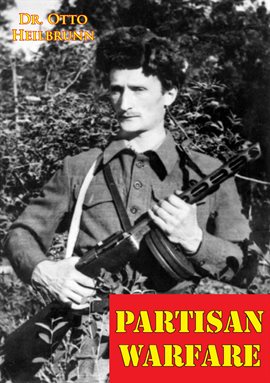
eBook
hoopla Instant
Partisan Warfare
Year
2016
Language
ENGLISH
Publication Information
Tannenberg Publishing
Summary
Dr Heilbrunn has already established himself as a historian of irregular warfare. But the subject is not merely a matter of past history, because the so-called 'nuclear stalemate', which has made total warfare improbable, has at the same time made limited warfare the only kind that the world can afford to risk. One hopes, naturally, that the risk will be avoided; but since even a conventional war of the traditional, pre-nuclear kind might easily lead unintentionally up to a total war between great powers and is therefore also likely to be avoided, there remains the residual danger of what may be called 'sub-conventional' warfare in marginal areas, which the great powers would be free to support or disown, to fan up or suppress, according to their immediate interpretation of their own interests. Such are the outbreaks which we have seen in recent years in Malaya, Vietnam, Algeria, Cyprus, Cuba, Laos and elsewhere. These are also, if Korea proves, as we hope, to have been the last conventional war between major powers, the kinds of war we must expect to see renewed in the future. The Resistance during the Second World War was the prelude to this new kind of warfare. It was not, of course, a new invention between 1940 and 1945: one remembers, on the contrary, the Spanish resistance during the Napoleonic Wars, which gave us the word guerrilla to add to our language, and the exploits of Lawrence and others during the Arab Revolt of 1917. But these were side-shows (Lawrence's own word) in support of a major conventional war, without which they would have achieved practically nothing. Since the Second World War, the corresponding outbreaks of irregular warfare have stood on their own as the major, if not the only, armed conflicts in their particular struggle, not a side-show in support of a major war elsewhere. The Spanish Civil War of 1936-8 is their archetype. Irregular warfare has accordingly become more professional and highly organized. It has had to acquire a sense of strategy, not merely of tactics. Perhaps eventually it will drop the epithet 'irregular'. Even by 1945 the 'partisans' of southern Europe and the Balkans had ceased to so describe themselves, and adopted instead the nomenclature of regular armies. Those who fought with the partisans of the Second World War will find that already there have been profound changes in the evolution of partisan warfare since 1945. But thanks to Dr Heilbrunn's keen sense of the continuity of that evolution, they will also recognize their own side-shows as forming an integral part of the history of this fascinating subject. He does us the honour of frequent quotation from our accounts of war-time experience; and it is encouraging to find that the lessons of that experience have been confirmed by later application elsewhere. His book is perhaps the first comprehensive study of the theoretical aspects of partisan warfare, at least in the English language. It is firmly grounded in practice, and likely to serve for a long time as a standard work.